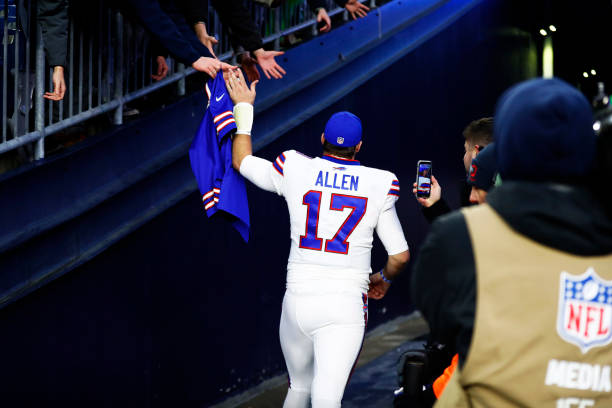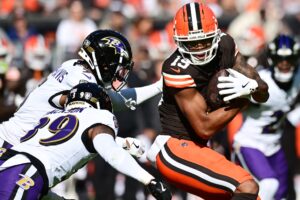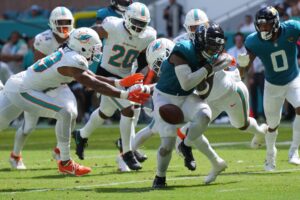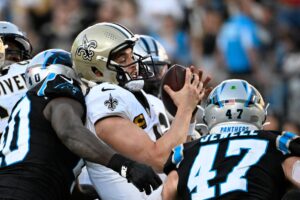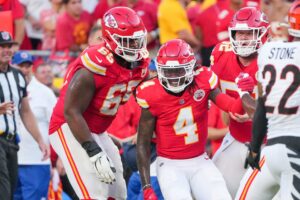The Buffalo Bills have themselves a really good quarterback in Josh Allen. The former first-round pick absolutely destroyed the Patriots through the air and the ground en route to a 47-17 thrashing in the AFC Wild Card Round. Allen didn’t make a single mistake all day and essentially got revenge on New England for their 20-year run of dominance. Josh Allen was obviously fantastic, but there is a strong case to be made that the quarterback had the best playoff performance of the modern era.
[pickup_prop id=”18053″]
Josh Allen Made History With Dominant Playoff Performance
Allen’s Night, Contextualized
If you watched even one Bills drive from last night, then you know that Josh Allen was simply on another level of existence throughout Saturday’s contest. The quarterback completed 21 of his 25 passes for 308 yards, five touchdowns, and no interceptions while adding another 66 yards on six carries. The Bills had seven meaningful drives, and each one ended in a touchdown. It goes without saying that finishing with more touchdowns than incompletions is a good thing, but the advanced stats show just how ridiculous Allen was.
According to RBSDM.com, Allen finished with a 99th percentile EPA/play, 99th percentile total EPA, and a 97th percentile completion percentage over expectation. RBSDM data goes all the way back to 1999, so it’s safe to say that Allen’s performance is one of the greatest of all time, regardless of opponent.
There’s no defense for a perfect throw pic.twitter.com/4nxTkYTk5p
— LastWordOnNFL (@LastWordOnNFL) January 16, 2022
He did all this with a 9.2 average depth of target, which goes to show that he wasn’t getting by on short, easy throws. Allen was attempting ridiculous passes throughout the night, and he was completing them with ease.
According to ESPN, Allen’s 98.5 QBR was the best playoff performance since they started recording the stat (2006). Others came close, but nobody was quite able to match what Allen did yesterday. Tom Brady put up a 98.0 QBR against the Jacksonville Jaguars in 2008, while Drew Brees and Patrick Mahomes posted identical 97.7 QBR’s in 2010 and 2020, respectively. QBR only goes back to 2006, so it doesn’t know about Peyton Manning’s dominant performance over the Denver Broncos in 2004.
Which Playoff Game Was the Best?
Based on the above, we’ve established five games that could be considered the best playoff performance of the modern era. Allen narrowly has the lead statistically, but it’s close enough to fall within the margin of error. Let’s take a closer look at each one of those games and see which performance truly was the best.
| Quarterback | EPA/play | CPOE | ADOT |
| Josh Allen | 0.86 | 17.8 | 9.2 |
| Tom Brady | 0.66 | 25 | 4.2 |
| Peyton Manning | 1.15 | N/A | N/A |
| Drew Brees | 0.45 | 9.3 | 8.8 |
| Patrick Mahomes | 0.57 | 6.1 | 7.6 |
The table above shows that Allen has the statistical edge on everyone except for possibly Manning. While Brady had the better CPOE in his 2007 domination, Allen’s advantage in EPA/play and ADOT gives him the edge there. It’s hard to contextualize how good Manning was, as we don’t have ADOT or CPOE data from the 2003 season. However, a 1.15 EPA/play is just ridiculously good and is the only game that, on paper, could match what Allen did.
2007/08 divisional playoffs.patriots vs Jaguars. Tom Brady breaks record for highest completion percentage. 92.9 26/28. Only two incompletions ok drops. Patriots beat jaguars 31-20. #patriots #jaguars #nfl pic.twitter.com/jyPAY9k1UM
— Martin Brian Ansah (@DaAnsahonSports) January 19, 2018
Of course, these metrics don’t know about the opposing defenses. New England finished the season as a top-five defense by just about every metric, so Allen deserves some bonus points for shredding an elite unit. The 2003 Denver Broncos, meanwhile, ranked 10th in dropback EPA/play allowed. So while Manning destroyed a good defense, Allen obliterated a great one.
Ultimately, it’s too close to say if Manning or Allen had the better day. So, at worst, Allen had the second-best playoff performance in the modern era.
Main photo:
Embed from Getty Images


